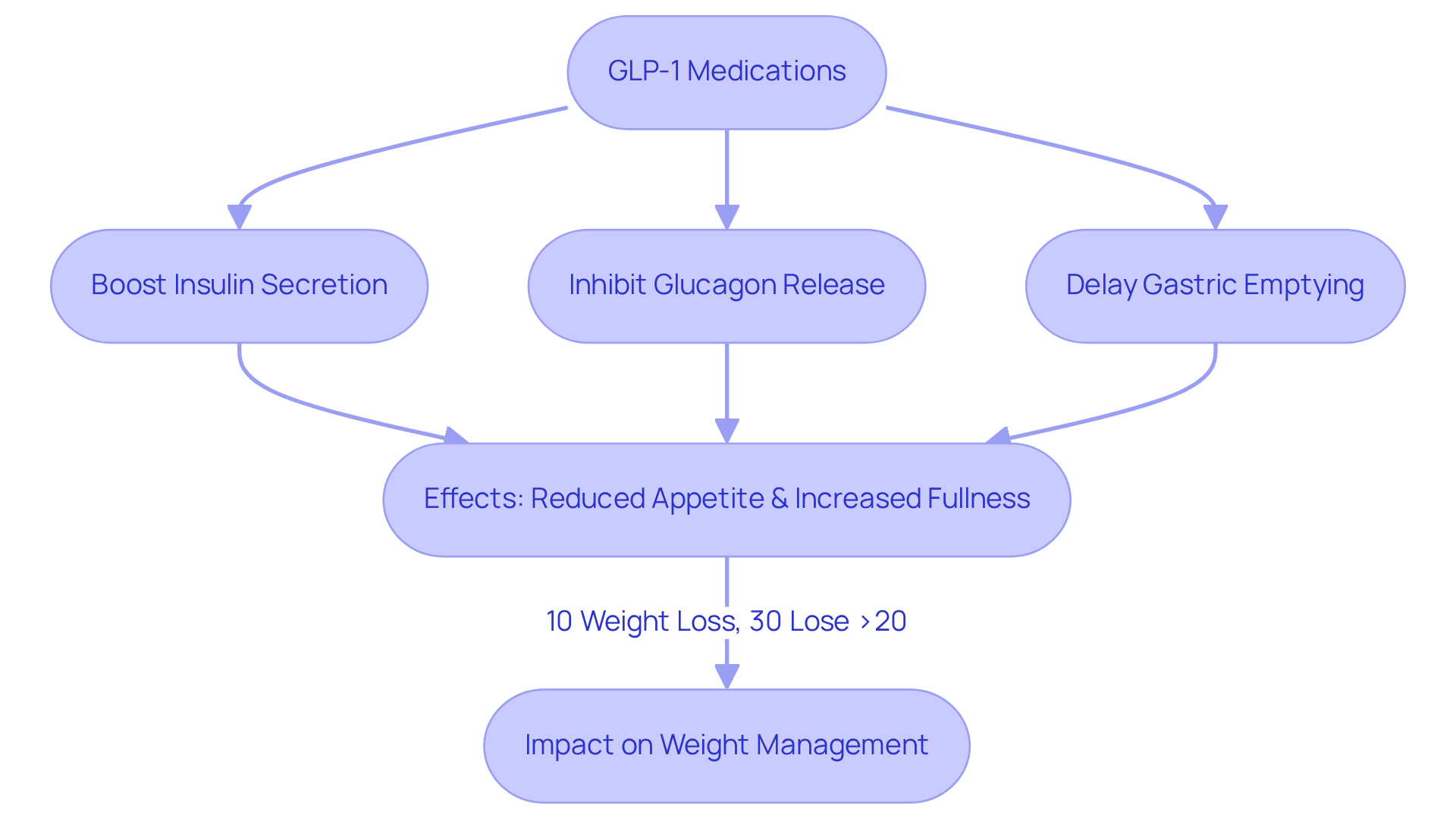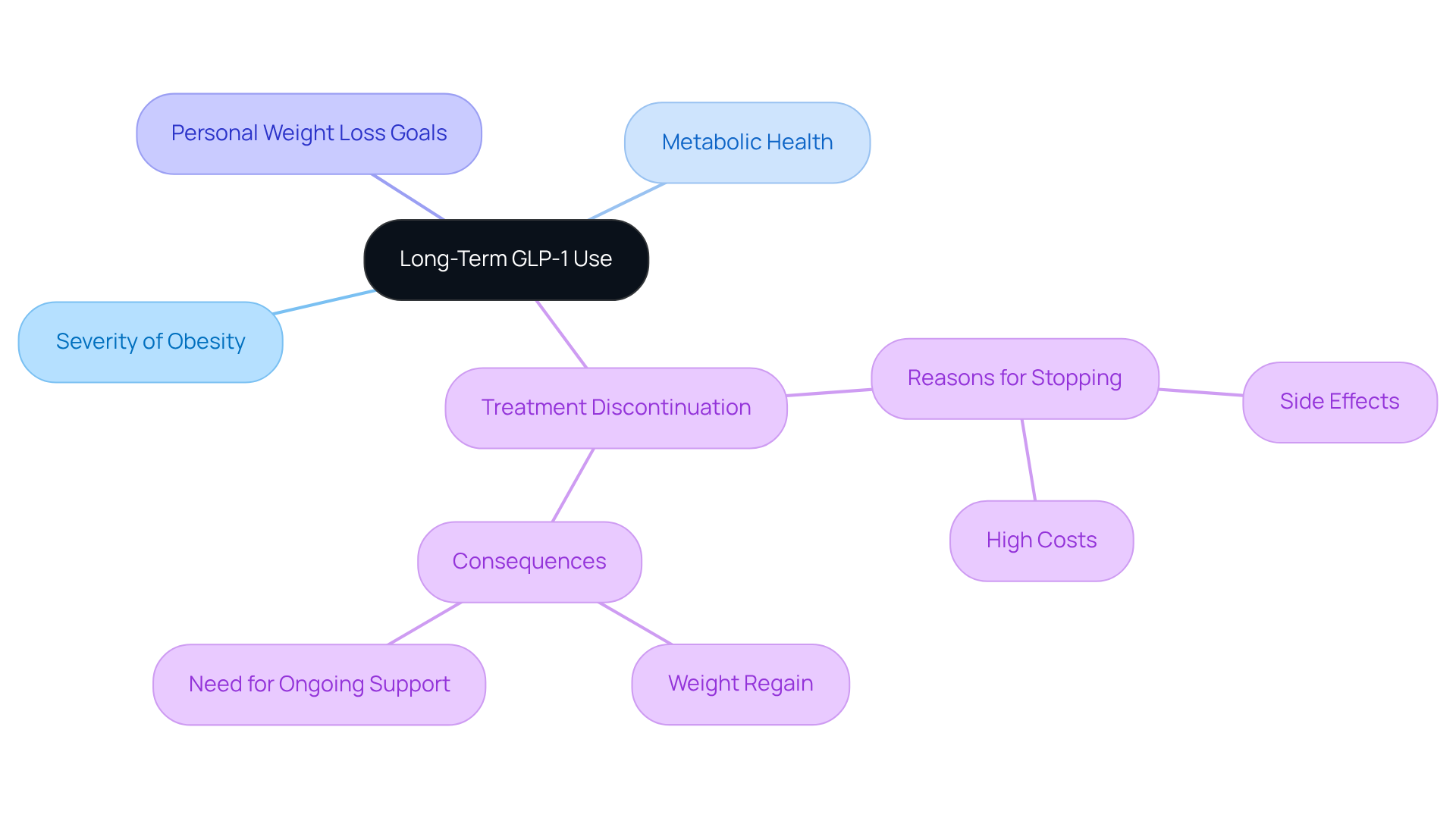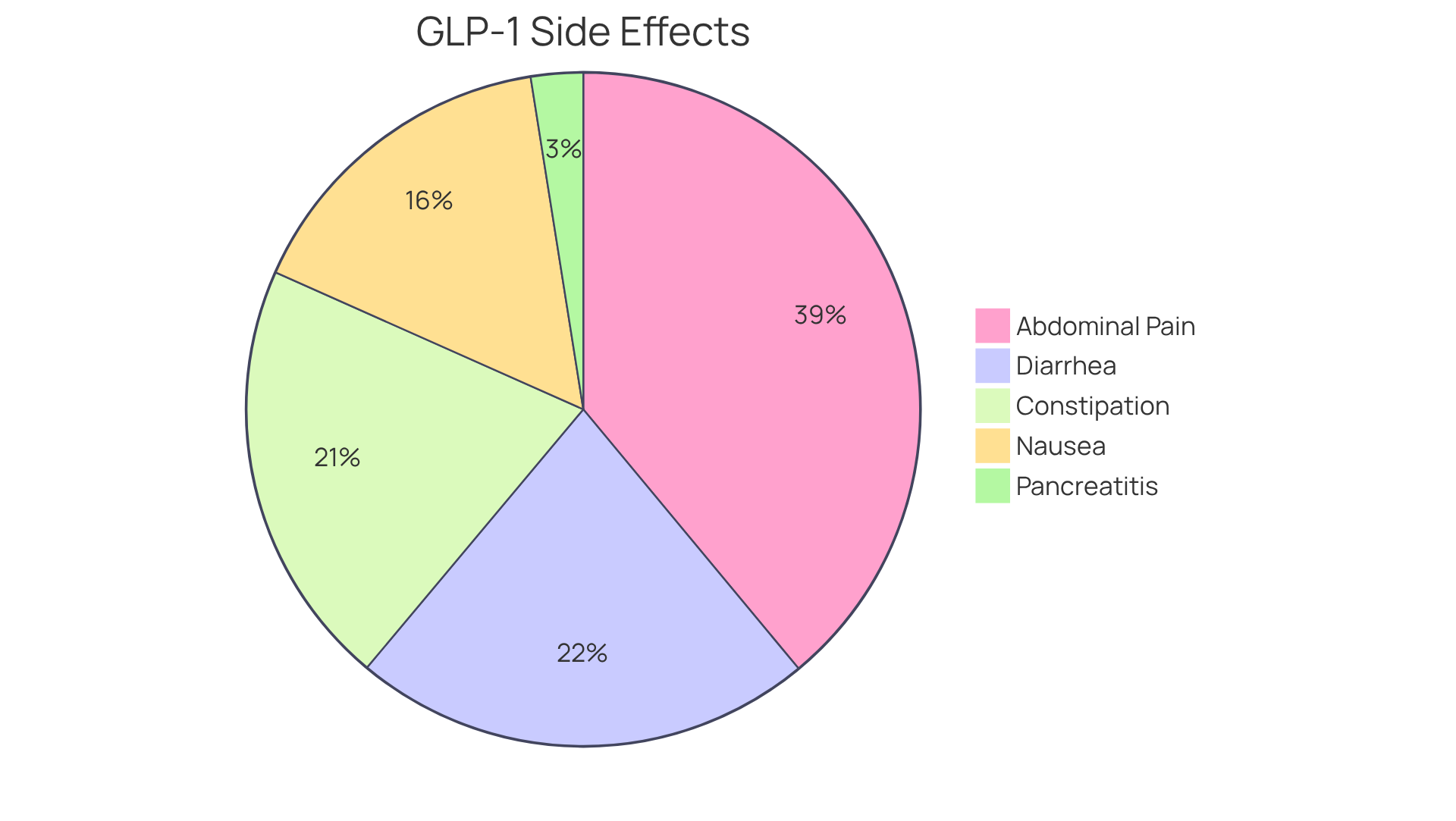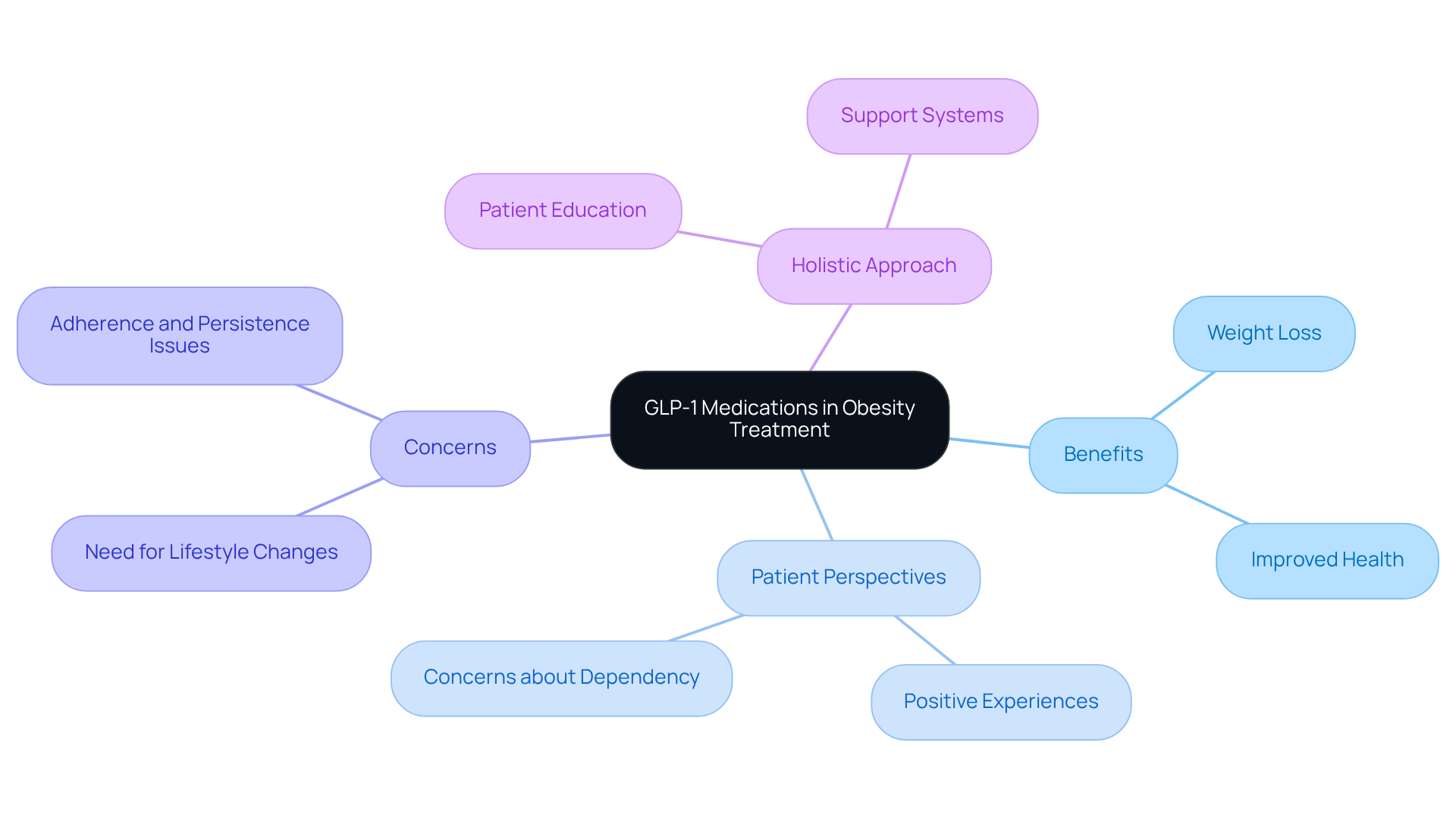Overview
The necessity of taking GLP-1 medications long-term often hinges on individual circumstances, such as the severity of obesity and personal weight loss goals. Many individuals encounter difficulties in maintaining their weight loss after stopping treatment, which can be disheartening. While some people may successfully achieve and sustain weight loss without ongoing medication, a significant number may find themselves regaining weight. This highlights the crucial role of continuous support and lifestyle changes alongside any medical treatment.
We understand that this journey can feel overwhelming at times. It’s important to recognize that you’re not alone in facing these challenges. Together, we can explore solutions that not only address your weight loss goals but also foster a healthier lifestyle. Remember, seeking support and making gradual lifestyle changes can make a significant difference in your journey.
As you navigate this path, consider how ongoing support can empower you. Whether it’s through community resources, professional guidance, or personal connections, the right support can help you maintain your progress. Let’s embrace this journey together, focusing on sustainable changes that lead to lasting success.
Introduction
The rise of GLP-1 medications, such as Ozempic® and Wegovy®, represents a remarkable step forward in the fight against obesity and weight management. These treatments not only help reduce appetite and enhance feelings of fullness but have also shown promising results in long-term weight loss for many individuals. However, a critical question arises: must patients rely on GLP-1 medications indefinitely to maintain their progress, or can sustainable weight management be achieved through alternative methods?
This article explores the necessity, risks, and patient perspectives surrounding the long-term use of GLP-1 therapies. We understand that navigating your weight loss journey can feel overwhelming, and we’re here to provide valuable insights that can empower you. Together, we can explore the possibilities and find a path that works for you.
Define GLP-1 Medications and Their Role in Weight Management
GLP-1 therapies, or glucagon-like peptide-1 receptor agonists, are designed to replicate the effects of the naturally occurring hormone GLP-1 in our bodies. Notable examples include Ozempic® and Wegovy®, which have become important tools in managing body composition. These treatments work by:
- Boosting insulin secretion
- Inhibiting glucagon release
- Delaying gastric emptying
All of which help to reduce appetite and increase feelings of fullness. This multifaceted approach can make it easier for individuals to manage their body mass effectively.
The effectiveness of GLP-1 medications is particularly significant for those struggling with obesity or type 2 diabetes. Clinical studies indicate that about one-third of individuals using Ozempic experience a reduction of approximately 10% in their body mass, with 10.5% of participants losing 10% or more of their body mass within 72 weeks. Additionally, data shows that 30 percent of patients may lose more than 20 percent of their initial mass, highlighting the potential for substantial weight loss. This sustained reduction in mass is vital for improving overall health outcomes, including better glycemic control.
Endocrinologists emphasize the importance of these treatments in combating obesity, noting that they not only support weight loss but also improve blood sugar control. As obesity is increasingly recognized as a chronic condition, it raises the important question: do you have to take GLP-1 forever for effective long-term body mass management? Their ability to mimic the physiological effects of gastric bypass surgery—by enhancing feelings of fullness—positions them as a valuable ally in the ongoing fight against obesity.
However, it is important to be aware that common side effects of GLP-1 medications can include nausea, vomiting, and diarrhea, which may impact adherence to treatment. Furthermore, the high cost of Ozempic, around $1,200 monthly, poses a financial barrier for many individuals seeking effective management solutions. At Minimal, we are committed to providing holistic health treatments that address these challenges, ensuring that those we serve receive comprehensive care tailored to their unique needs. Together, we can navigate this journey toward better health.
Examine the Necessity of Long-Term GLP-1 Use
The requirement for prolonged usage of specific medications varies significantly from person to person, influenced by factors such as the severity of obesity, metabolic health, and personal weight loss goals. Have you ever felt overwhelmed by the journey of losing weight? Studies reveal that while some individuals achieve substantial weight loss and maintain it without ongoing treatment, many struggle to keep their results after discontinuing GLP-1 therapy, leading to the question, do you have to take GLP-1 forever? Alarmingly, research indicates that between 50% to 75% of patients stop using these treatments within a year, often due to side effects or high costs. For those who do stop, the risk of regaining lost pounds is considerable, highlighting the crucial need for ongoing support and lifestyle changes alongside treatment.
At Minimal, we understand your journey. Our weight loss program begins with a compassionate consultation to assess your health and identify the best treatment plan for you, which may include prescription options like Semaglutide. We believe in a holistic approach, merging medical treatments with personalized fitness and nutrition strategies to foster long-term success. Together, we can achieve your goals! This integrated method emphasizes the importance of combining medical treatment with sustainable lifestyle changes.
As Dr. Chun-Su Yuan wisely notes, “The drawback of any weight-loss treatment is that, once the individual stops it, often the weight will begin to return, leading to the question of whether do you have to take GLP-1 forever to maintain the results, no matter what else the individual is doing to counteract it.” We’re here for you every step of the way, ensuring you have the support you need to navigate this journey.
Identify Risks and Side Effects of GLP-1 Medications
GLP-1 medications can be a helpful part of your weight loss journey, but it’s essential to consider the associated risks. Many individuals experience common side effects, such as gastrointestinal disturbances, including nausea, vomiting, diarrhea, and constipation. These can be challenging and may impact your ability to stick with the treatment. In fact, studies show that up to 57.6% of users report abdominal pain, while around 23.4% experience nausea.
There are also more serious risks to keep in mind, such as:
- pancreatitis
- acute kidney injury
- thyroid tumors
These risks have been highlighted in various clinical studies. For instance, the occurrence of pancreatitis among individuals using certain medications has been reported at rates between 3.4% and 4.0%. If you have pre-existing conditions like chronic kidney disease or heart failure, it’s crucial to be aware that you may face heightened risks, which is why close monitoring during the initial phases of treatment is so important.
Healthcare professionals stress the significance of recognizing symptoms that require immediate medical attention, such as:
- severe abdominal pain
- jaundice
- persistent nausea
By understanding these potential risks, you can better weigh the benefits of weight loss against the possibility of adverse effects. This knowledge empowers you to make informed decisions about your treatment options. Remember, you’re not alone in this journey; together, we can achieve your goals and find the best path forward.
Explore the Impact of GLP-1 on Obesity Treatment and Patient Perspectives
Wegovy and similar medications have significantly impacted the journey of obesity management, offering a compassionate choice for those grappling with body control challenges. By mimicking the hormone GLP-1, Wegovy helps regulate appetite and food intake, leading to meaningful weight loss. Many patients have shared their positive experiences, noting not just a reduction in weight but also an improvement in their overall health. Research indicates that individuals using Wegovy, along with a reduced-calorie diet and increased physical activity, experienced greater weight loss compared to those on a placebo.
However, it’s important to recognize that opinions on the question of do you have to take GLP-1 forever vary. While some individuals appreciate the support these treatments provide, others express concerns about dependency and question, do you have to take GLP-1 forever to prevent potential weight regain after discontinuation? The effectiveness of this therapy is often enhanced when combined with lifestyle changes, underscoring the importance of a holistic approach to obesity management.
Overall, GLP-1 medications like Wegovy represent a hopeful advancement in the fight against obesity. Remember, ongoing patient education and support are vital for achieving lasting success. Together, we can navigate this journey and work towards your health goals.
Conclusion
GLP-1 medications have emerged as a crucial component in the management of obesity and type 2 diabetes, offering a multifaceted approach to weight loss by mimicking the effects of the naturally occurring hormone GLP-1. Their role in enhancing insulin secretion, reducing appetite, and promoting feelings of fullness has made them a valuable tool for many individuals striving for effective body mass management. However, a common concern for patients and healthcare providers alike is whether these medications must be taken indefinitely.
While GLP-1 medications can lead to substantial weight loss and improved health outcomes, the necessity of long-term use varies based on individual circumstances, including the severity of obesity and personal health goals. Many patients may face challenges such as side effects, financial burdens, and the potential for weight regain after discontinuation. It’s essential to integrate lifestyle changes alongside medical treatment for sustainable success, and ongoing support is crucial in navigating this complex journey.
Ultimately, the insights shared emphasize the importance of a holistic approach to obesity management. As the landscape of weight loss treatments continues to evolve, understanding the implications of GLP-1 therapies and fostering a supportive environment can empower individuals to make informed decisions about their health. Engaging in personalized treatment plans that combine medication with lifestyle modifications can pave the way for lasting change, encouraging individuals to take proactive steps toward achieving their weight loss and health goals. Remember, together, we can achieve your goals, and we’re here for you every step of the way.
Frequently Asked Questions
What are GLP-1 medications and how do they work?
GLP-1 medications, or glucagon-like peptide-1 receptor agonists, replicate the effects of the hormone GLP-1 in the body. They work by boosting insulin secretion, inhibiting glucagon release, and delaying gastric emptying, which helps reduce appetite and increase feelings of fullness.
What are some examples of GLP-1 medications?
Notable examples of GLP-1 medications include Ozempic® and Wegovy®.
Who can benefit from GLP-1 medications?
GLP-1 medications are particularly effective for individuals struggling with obesity or type 2 diabetes.
How effective are GLP-1 medications for weight loss?
Clinical studies show that about one-third of individuals using Ozempic experience a reduction of approximately 10% in body mass, with 10.5% losing 10% or more within 72 weeks. Additionally, 30% of patients may lose more than 20% of their initial mass.
What health benefits are associated with the use of GLP-1 medications?
Sustained weight loss from GLP-1 medications can improve overall health outcomes, including better glycemic control.
Do individuals need to take GLP-1 medications long-term for effective weight management?
There is a question regarding the necessity of long-term use of GLP-1 medications for effective body mass management, as they mimic the physiological effects of gastric bypass surgery.
What are the common side effects of GLP-1 medications?
Common side effects can include nausea, vomiting, and diarrhea, which may affect adherence to treatment.
What is the cost of GLP-1 medications like Ozempic?
The cost of Ozempic is approximately $1,200 monthly, which can be a financial barrier for many individuals seeking effective management solutions.





















